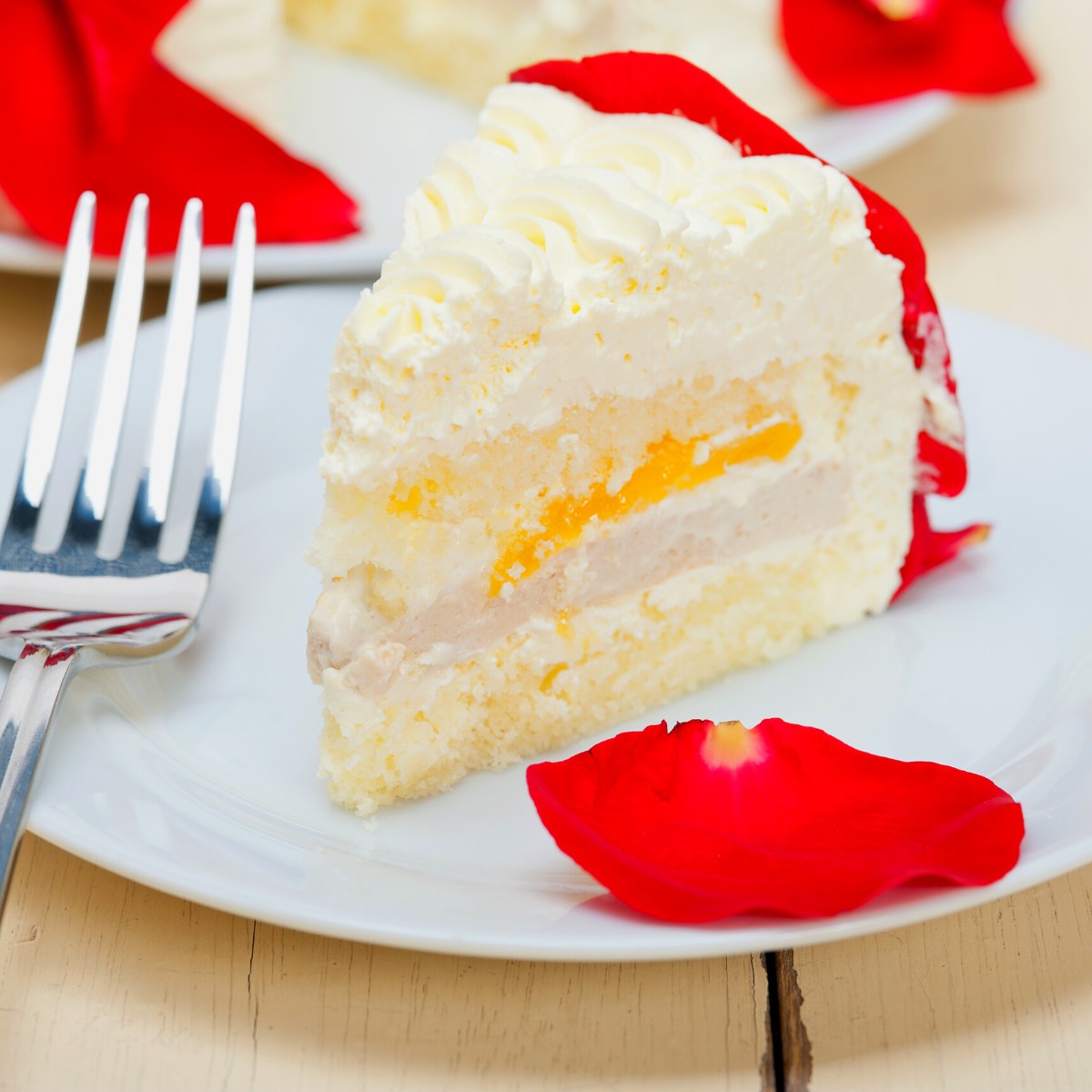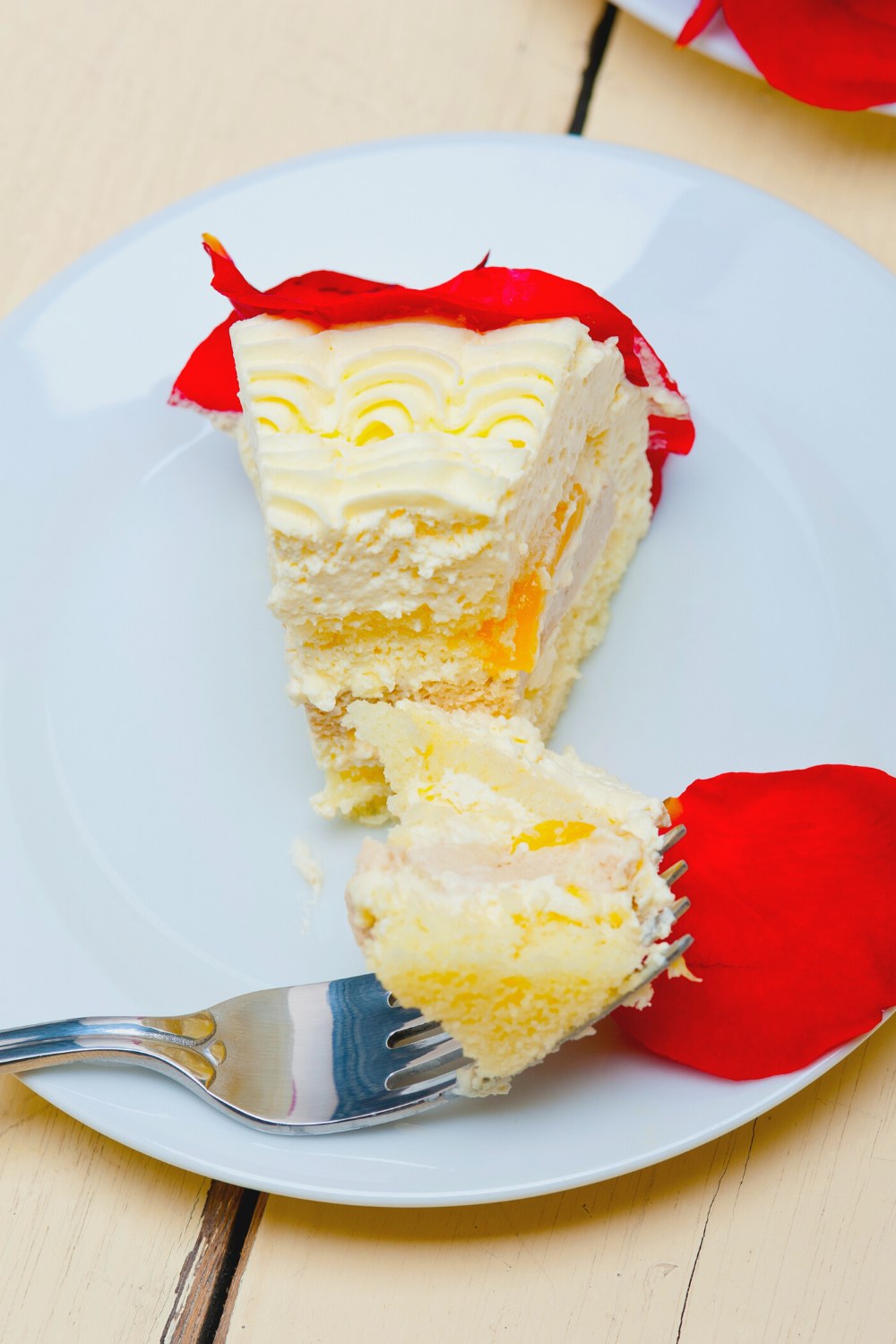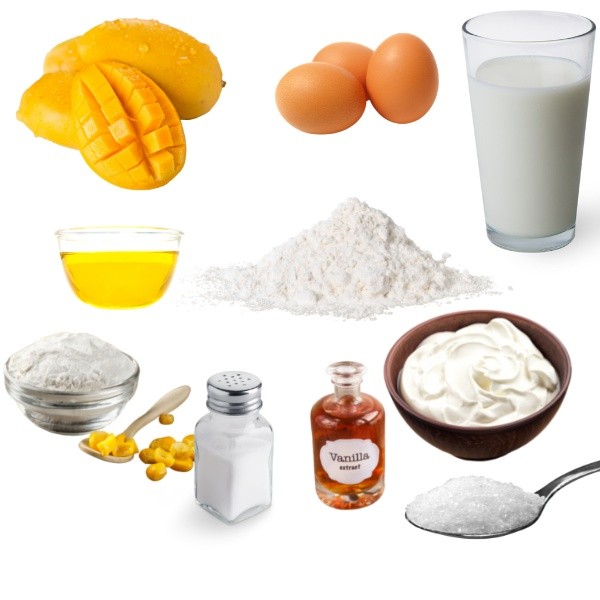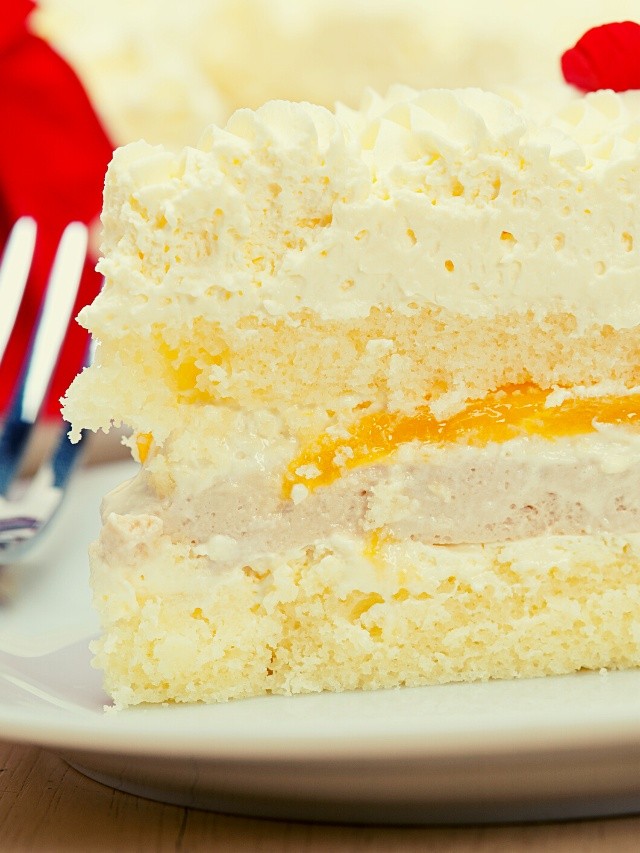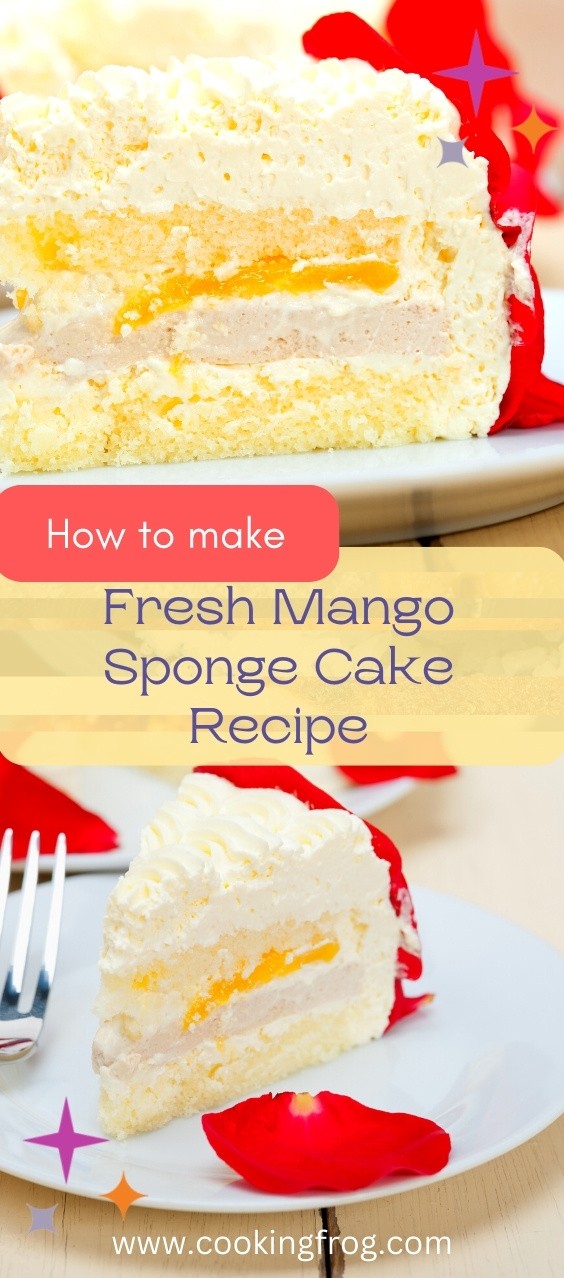This mango cake has a sponge cake base, a fresh and juicy mango, and a light vanilla whipped cream frosting. You won’t find a cake as moist and wonderful as this Mango Cake.
Mango Sponge Cake
Usually, when I’m in a hurry, my cake recipes entail opening up a box and putting in the basic ingredients. It’s always an ok cake. But nothing compares to creating a cake from scratch! Every time I make this Mango cake, it turns out perfectly moist and flavorful.
Don’t be frightened by this introduction; once you make this mango cake, you’ll see how easy it is. It takes 30 minutes to prepare everything and one hour to bake.
Mango with layers of fluffy sponge cake—how can you go wrong? You may get similar mango cakes at Asian bakery shops, but this one is even more delicious. Mango-filled with the fluffiest sponge cake you’ve ever baked, this will make you question your bakery loyalty. You’ve found the ideal sponge cake foundation here.
I’ve spent years in the kitchen searching for the ideal cotton sponge cake with a light, airy texture and just enough structure to hold this fruit cake and whipped topping fillings. Italian “Pan Di Spagna” is one of my favorite desserts (it’s a basic sponge cake with unlimited topping and filling possibilities). I even use mango as a filling for Italian sponge cake most of the time.
While I still enjoy using the sponge cake recipe I posted earlier this year; this one tastes even better. If you want the perfect cotton sponge cake, follow these steps.
Ingredients you’ll need
Mangoes
Egg yolks and Egg whites
Milk
Vegetable oil
Cornstarch
All-purpose flour
Sugar
Salt
Thickened cream
Vanilla extract
How to make Mango Cake
Scroll to the recipe box for a detailed mango cake recipe with ingredients and measurements. Also, be sure to check the tips for each stake of making the cake at the end of the article.
For the sponge cake
Step 1: Set the oven to fan-forced 320 F (160°C). Use parchment paper to line the bottom of a 6-inch cake pan.
Step 2: Mix the egg yolks, vegetable oil, milk, and cornstarch in a medium bowl. Add the flour and salt, then whisk just until incorporated.
Step 3: Using a stand mixer bowl with a whisk attachment, beat the sugar and egg whites until they form stiff peaks.
Step 4: Fold the meringue into the mixture of egg yolks in three portions, trying not to collapse the bubbles. Fill the cake pan with the cake batter. Place the cake pan in a bigger baking pan filled with 1/2 inch of boiling water.
Step 5: Bake the cake for 1 hour. You’ll know it’s done because it should bounce back when you touch it. To cool, use a wire rack. Once the cake is cool, pass a knife around the pan’s edge and turn it over. Wrap in plastic wrap and put in the fridge
For the whipped cream
Step 1: Cream, vanilla extract, and sugar should all be combined in the bowl of a stand mixer with a whisk attachment. Whisk until medium-stiff peaks form.
Step 2: Refrigerate until you’re ready to assemble the cake.
Assemble the cake
Step 1: Peel your mangoes and slice each one into 6-8 cubes. Cut the leftover mango into thin pieces.
Step 2: Split the cake into three equal size layers. Put a cake layer on a turntable, then spread a thin coating of cream over the cake. Place the pieces of mango that have been thinly cut on top of the cream, and then cover them with additional cream. Place the second layer of sponge cake on top. Repeat the process, then cover it with the last layer of sponge cake.
Step 3: Spread a thin layer of cream over the surface of the cake using a palette knife, and as you do so, spin the turntable to achieve a smooth finish. To create a border around the edge of the cake using the leftover cream, place it in a piping bag with a star tip attached to it.
Step 3: Mango cubes can be used as decoration; after decorating, chill the cake for a few hours before serving.
FAQs
How to store mango cake?
If kept in an airtight container, this mango cake can keep for up to three days in the refrigerator.
Can I add different fruits to this cake?
Absolutely, yes! Feel free to combine your favorite fruits or alter the fruits around to suit your preferences.
Why did my sponge cake collapse?
Your sponge cake was probably underbaked if it lost too much of its airy texture. There are a few reasons why this may be the case: The cake wasn’t cooked long enough, the water bath had too much water, and the oven temperature was too low.
Mango Cake Recipe
Fresh and juicy mango and fluffy, cotton-soft sponge cake make up this mango cake, which is then topped with delicate vanilla whipped cream.
Prep Time: 35 minutes
Cook Time: 60 minutes
Calories: 420
Ingredients
For the Sponge Cake
- 3 Egg yolks
- 3 Egg whites
- ¼ cup of Whole Milk
- 3 TBSP of Vegetable oil
- 1/3 cup of Cornstarch
- 1/3 cup of All-purpose flour
- 1/3 cup of White sugar
- Pinch of salt
For the Whipped Cream
- 2 cups of Thickened cream
- ½ cup of White sugar
- 1 tsp of Vanilla extract
For the Assembly
- 2 mangoes, large
Instructions
For the cake:
- Set the oven temperature to 320 F, fan forced.
- Use parchment paper to line the bottom of a 6-inch cake pan.
- Mix the milk, egg yolks, vegetable oil, and cornstarch in a medium bowl.
- Add the flour and salt, then whisk just until incorporated.
- In the stand mixer bowl with a whisk attachment, beat the sugar and egg whites until they form stiff peaks.
- Fold the meringue into the egg yolk mixture in three additions, being careful not to collapse the bubbles.
- Pour the cake batter into the baking pan.
- Place the cake pan in a bigger baking pan and add 1/2 inch of boiling water to the pan.
- Bake the cake for 60 minutes. You’ll know when it’s done when you push it a bit; it should bounce back. When it’s done, place it on a wire rack to chill.
- When the cake is cool, run a knife along the edge of the pan and flip it over. Place it in the fridge till you’re ready to assemble it.
For the whipped cream
- Mix the sugar, cream, and vanilla extract in the stand mixer bowl with a whisk attachment. Whisk the mixture until firm peaks form.
- Refrigerate until assembly.
Assembling the cake
- Peel the mangoes, cut each into 6 to 8 squares, and cut the remaining mango into thin slices.
- Cut the sponge cake into three layers equally. Put a layer of cake on a turntable and spread a thin layer of cream on top.
- Add thin slices of mango on top of the cream, and then add more cream on top. Cover it with a second layer of cake.
- Repeat the procedure, and then put the last sponge layer on top.
- Spread a thin layer of cream over the cake with a palette knife as you spin the turntable to achieve a smooth finish.
- Put the rest of the cream in a piping bag and pipe a border around the cake with your preferred tip shape.
- Place the mango cubes as decoration, then chill for a few hours before serving.
Tips for The Best Mango Cake
Make sure you use an aluminum cake pan that is non-stick.
When baking soft sponge cakes, using a cake tin without a non-stick coating is crucial! The edges of the cake tin serve as a barrier against which the batter can climb while baking. This guarantees the cake’s lofty sides and sturdy structure. In contrast, a non-stick cake tin’s sides would allow the batter to glide down them.
Mix the cornstarch into the egg yolks.
Cornstarch is a crucial component if you want a soft sponge cake that will stay together. To make a softer sponge cake, we can reduce the quantity of gluten formed during mixing by substituting part of the flour with cornstarch. Because flour tends to make baked goods harder, it’s important to mix the cornstarch and other wet ingredients thoroughly to integrate it before folding in the flour.
Don’t overmix the flour.
Contrary to cornstarch, overmixing flour may make a cake difficult or gummy. This is due to the fact that the more you mix flour, the more likely it is to develop gluten networks. Gluten provides bread its chewy texture and structure, but we don’t want that in a cake. Use a whisk to gently incorporate the flour in after sifting it into the egg yolk mixture until just blended.
The egg yolk mixture should be lightened before adding to the remaining meringue.
The most common method for preparing sponge cakes involves adding the meringue to the mixture of egg yolks and gently folding it in. This approach, in my opinion, raises the risk of undermining. When you undermix a sponge cake, the meringue and egg yolk mix will separate during baking, which is what results in a rubbery egg-like base.
To avoid this, add a third of the meringue and blend thoroughly with the egg yolk mixture. After that, add your meringue to the lighter egg yolk mixture, and fold just until incorporated. This technique ensures that the ingredients are well combined while preventing the meringue from collapsing.
Bake the cake in a water bath.
A water bath is crucial for a variety of reasons. A water bath evens out the oven’s temperature, making the atmosphere wet enough for the cake to rise without sharp rises and noticeable splits. A water bath aids in the retention of moisture in the batter during baking, giving the sponge a softer feel.
Avoid overfilling the water bath since doing so might reduce the oven’s temperature and lengthen the time it takes to bake the cake. I advise adding enough boiling water to a large baking tray to fill it to the top of the cake pan, or 1/2 inch. As the water bath is primarily required during the first stages of cake baking, don’t worry if it dries up throughout baking.
Share the image below to your Pinterest board if you like this Mango Sponge Cake!

